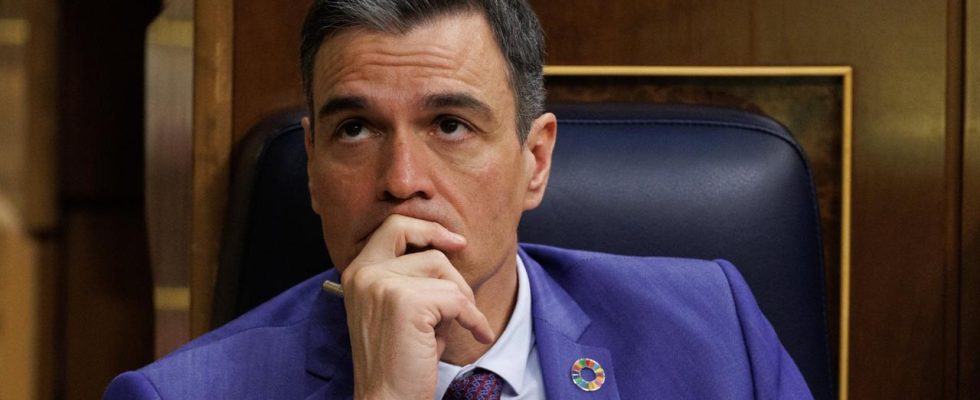background
Spain’s Prime Minister Sánchez is playing poker. He has scheduled early parliamentary elections for the end of July. Right-wing and right-wing extremist parties are on the rise. Sanchez is in a position reminiscent of Angela Merkel’s.
Whenever Spain’s Prime Minister Pedro Sánchez and then-Chancellor Angela Merkel met, it was obvious that the Social Democrat and the Christian Democrat got along well, both on a work and personal level.
Both have or had a similar problem: highly regarded abroad, but often hostile, if not demonised, at home. At times Merkel was celebrated like an international rock star, while Sánchez was long considered a great hope of European social democracy.
Combat term “sanchismo”
Domestically, on the other hand, since taking office in 2018, Sánchez has been exposed to a combat term created by the largest opposition party, the conservative People’s Party (PP), the so-called “sanchismo”.
The Prime Minister is thus declared a quasi-authoritarian, undemocratic figure who rules his party PSOE as if it had no identity of its own. PP boss Alberto Núñez Feijóo speaks of the abolition of “sanchismo” as if it were an authoritarian system – at the height of the corona pandemic, similar hostilities against Merkel had become loud.
Two people who got along with each other politically and personally: Angela Merkel and Pedro Sanchez
Distrust also in their own camp
And this discourse catches on. In fact, parts of Spanish society have taken hold of the idea that the next parliamentary elections could be manipulated or that the PSOE could end up splitting up Spain and handing over the Basque country to the left-nationalist electoral alliance EH Bildu and Catalonia to the pro-independence electoral alliance.
Sánchez, according to the narrative, which the head of the right-wing extremist party Vox, Santiago Abascal, also likes to use, is obsessed with power and doesn’t even shy away from collaborating with “terrorists and putschists.”
The strategy is obvious: the parliamentary elections are to be a vote on the prime minister. It has already emerged in the local and regional elections, because in the run-up to politics and issues it was as good as nothing, but above all about the personality of Pedro Sánchez and the specter of the fictitious “sanchismo”.
Even some on the left mistrust Sánchez. In the absence of a majority of his own in the Spanish parliament, he repeatedly allows himself to be supported by Basque and Catalan separatists and therefore regularly has to make concessions. On the one hand, this is already a tradition of PSOE minority governments, on the other hand, welcome ammunition for the opposition.
Political successes go under
The coalition government of the PSOE with the left-wing alliance Unidas Podemos can certainly point to political successes: Spain has recovered relatively well economically from the pandemic and is growing faster than most EU countries.
Unemployment, while still relatively high, is at its lowest level in years. Since the labor market reform, which was brought through parliament with great difficulty, the number of permanent employment contracts has been increasing continuously.
Higher minimum wages, higher pensions, better tenant protection and protection against dismissal, lower energy prices, help for farmers affected by the consequences of climate change – but all of this is being drowned out by an increasingly strident political discourse.
It would be an excellent opportunity to discuss whether the government does not often primarily use these benefits to treat symptoms. Or how generous it would be without access to EU funds.
The curse of “sitting out”
In addition, there are home-grown problems such as the unsuccessful reform of sexual criminal law under the leadership of Equal Opportunities Minister Irene Montero from Unidas Podemos. The small coalition partner had pushed the PSOE “progressively” on this topic, adding points that could not be conveyed to the Social Democrats or large parts of the Spanish population – in 2019 less than ten percent of those eligible to vote had given their vote to the left-wing alliance.
The so-called “Solo sí es sí” law (in English: only yes means yes) was actually intended to improve the protection of those affected by sexualised violence. However, due to technical errors, numerous convicted sex offenders were released early from prison or at least had their prison terms reduced.
Sánchez – Merkel also comes to mind here – initially let things run idly for months. Only when polls showed that many Spaniards held him personally responsible for the debacle did he intervene and ultimately had to push through the reform of the botched reform together with the opposition.
problems in the coalition
This has further damaged the already difficult relationship between PSOE and Unidas Podemos. The left-wing coalition was also punished in the local and regional elections and was apparently caught off guard by the decision to bring forward the parliamentary elections.
Unidas Podemos must now quickly clarify their relationship with the new left-wing movement “Sumar” and decide whether to run for election on joint lists – or in competition with each other.
Everything on camp campaign
Sánchez also wants to turn the election into a plebiscite: either I remain prime minister or right-wing extremists become part of a nationwide government for the first time. For many on the left, and especially for those who support Basque or Catalan independence, this is a nightmare.
Vox could be the opponent Sánchez now needs to mobilize his voters. That’s why he apparently puts everything on one card: camp election campaign.

